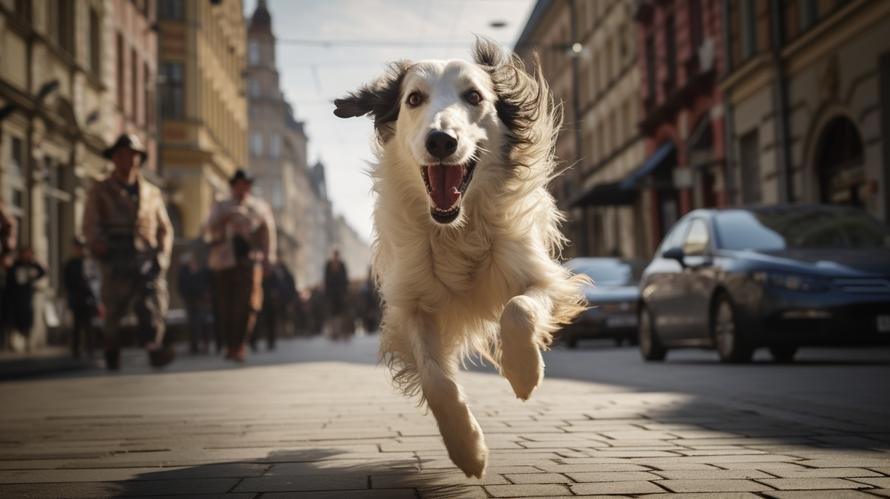Like a graceful ballet dancer, the Borzoi dog breed, also known as the Russian Wolfhound, strikes an intriguing balance between strength and delicacy. They have a rich history linked to Russian nobility and hunting, known for their uncanny speed and high-endurance capacity primarily used for hunting wolves and rabbits. But what truly sets them apart is their dignified and aloof yet warm-hearted nature and, of course, their indisputable elegance.
However, unless you’re familiar with these beautiful creatures, there’s one mystery that might have you scratching your head: what do Borzois love to eat?
They’re not as intimidatingly picky as some pure breeds, but they’re certainly not doggie dumpsters either, so finding the right balance for their diet can be a bit like striking gold: it’s rewarding when you’ve hit the jackpot. After all, like humans, every dog is unique, and its diet should reflect this.
Before we delve deeper into revealed Borzoi food preferences, let’s remember that it’s essential to consult with your vet before making any significant changes in your dog’s diet. Food impacts not only your fur baby’s physical health but also its behavior and overall well-being.
It’s also worth noting that just like humans, what one Borzoi eats may vary significantly from what another eats due to personal preferences, health conditions, and lifestyle differences. Therefore, this article aims to give you an overall guideline based on experienced Borzoi owners and breeders’ insights but should not be taken as a strict standard.
Typically, Borzoi dogs thrive on high-quality dog foods, whether they’re commercially made or prepared at home. Their meals should include the necessary proteins, carbohydrates, fats, minerals, and vitamins that are crucial for their overall well-being. But let’s break this down even further to understand the favorite foods of Borzois.
First on the list are proteins. No surprise here as dogs are primarily carnivores. However, with a Borzoi, you have quite a connoisseur. They enjoy a good variety, including chicken, turkey, beef, and fish, with many fanciers swearing their hounds have a particular fondness for salmon. Protein should make up around 18-22% of a Borzoi’s diet.
Now, when it comes to carbohydrates, due to their sensitive digestive system, Borzois may prefer specific sources such as sweet potatoes, rice, and oatmeal. Indeed, many Borzoi owners report that their dogs have a special fondness for sweet potatoes, likely due to their natural sweetness and plenty of vitamins. However, these should be given in moderation. It’s also essential to introduce these slowly into their diets, as a sudden change can lead to an upset tummy.
Healthy fats are also a joy among Borzois, just like us humans. So foods like fish oil and flaxseed have been well-loved due to their Omega-3 fatty acid content which can be great for their shiny fur. Typically, a Borzoi’s diet should have around 5-10% fat.
As far as vegetables and fruits go, remember that Borzois have a bit of a sensitive stomach. So any new foods should be introduced slowly. That being said, some Borzois have a fondness for carrots, fresh blueberries, and even apples (without the seeds, of course)! It’s crucial however that these only make up a fraction of your dog’s diet and should not replace their regular meals.
Interestingly, many Borzoi owners report that their dogs love to munch on carrots. This could be because of their crunchy texture and sweetness. An added plus, carrots provide a natural and effective way to maintain your Borzoi’s dental health. Blueberries, on the other hand, are an abundant source of antioxidants and beneficial for heart health.
Then, there are treats. Most dogs love a good treat, and Borzois are no exception. Try to opt for healthier alternatives such as dehydrated lean meats, fresh vegetables, or plain, unsweetened yogurt rather than fatty, sugar-filled commercial treats. Peanut butter (xylitol-free) stuffed into a Kong is a positively loved delicacy among Borzoi and can keep them entertained for hours!
That being said, it’s crucial to avoid some types of food altogether. Foods like chocolate, grapes, raisins, onions, garlic, Macadamia nuts, alcohol, and caffeine are all toxic to dogs – including our refined Borzois.
Lastly, let’s talk about feeding frequency. Adult Borzoi typically eats two meals a day while puppies may need three or more. This helps prevent gastric torsion, a potentially fatal condition that Borzois are prone to. Always ensure that your dog is eating in a calm and relaxed environment and restrict heavy activity immediately after meals for further protection.
In conclusion, while Borzois may have a discerning palate and require a balanced diet, they also enjoy indulging in delightful and healthy food varieties. The key is to understand their individual food preferences, be patient, and find the right balance to keep their tails wagging and their bellies happily filled. Just remember, your bond with your Borzoi extends to how you feed and nurture them, making mealtime another opportunity to strengthen your unique and priceless relationship with them.



